Three weeks ago, I was thinking about 'commitment' and in particular, when we do not want to take sides in a conflict, either for fear of the consequences or due to laziness.... Then, I searched, on the Internet, for a conference of some spaniard, about the Commitment; but I could not find anything.
However, few days later, I found a very interesting conference, by Miguel Ángel Tobías, about the fears that do not allow us to advance in our life.
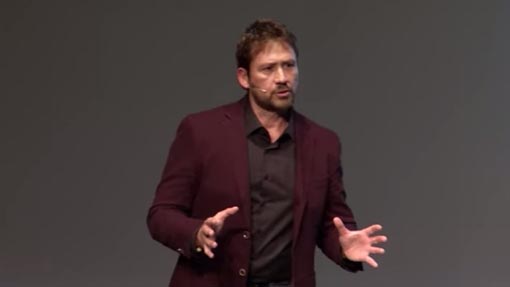
Miguel Angel Tobías
Miguel Angel is a Producer and Film Director. In 1994, he started working at Telecinco (on health issues). Then he worked at Telemadrid. Later he worked in Antena 3 and, finally, he was hired in Televisión Española (TVE) --where he started presenting two galas and the specials of Christmas Eve and New Year's Eve--.
In 2003, he founded Acca Media, with the intention of covering a clear gap in audiovisual production, to unite the concepts of culture and entertainment. With this premise, he created one of the most successful television formats of the last decade,”Españoles en el mundo” ("Spaniards in the World"), which he produced, directed and presented, at TVE, during its first stage.
From there, he developed a whole line of work with the idea of producing and directing audiovisual projects that serve society as Training, Dissemination, Education, and that promote universal values, such as Equality, Solidarity, Justice, Peace ...
Miguel Angel has also developed other formats for television and documentary series.
Committed to the diffusion of values, citizen awareness and mobilization, it has dedicated enormous resources of its own to the dissemination of social, solidarity and charitable causes. He produced and directed, as if lost, the first and only documentary, made in Haiti, after the devastating earthquake, in 2010, “Sueños de Haití”, with which he raised funds, for different projects in that country.
In 2014, Miguel Angel premiered the documentary "Gurba, La Condena".
In 2015, he filmed the documentary "Rising Nepal", about the earthquake that devastated that country.
In 2016, he premiered the documentary "El Caos y el Orden", about the life of the painter and sculptor, Manuel Felguérez, from Mexico.
In 2017, he premiered the documentary, "Gritos de silencio", against bullying.
At the same time, and for two years, he has been working on the documentary, “Un dia en el mundo” ("One day in the world"), about hunger in the whole earth.
The last audiovisual project, by Miguel Angel, in coproduction with TVE and in this year 2018, is the film "My name is Gennet", which tells the story of the first Spaniard congenital deafblind to get a university degree --it is the first in Spain and in Europe--.
But, in addition to working as Producer and Director, Miguel Angel also offers talks and conferences at Universities, Congresses and Companies, on Human Rights, Solidarity, Leadership, Dignity, Creativity and Entrepreneurship. One of those conferences is the one that I would like to summarise to you next.
In 2015, Miguel Angel received, from the President of the Republic of Italy, the decoration of Knight of the Order of the Star of Italy (Order of the Star of Italian Solidarity), in recognition of his personal and professional commitment, with the Social causes and Human Rights.
Among his lectures, there is one, in Seville, that I have found --as I said at the beginning of this post--.
With this conference, Miguel Ángel wants us to think, dream, imagine and be emotional; and he will try it with the help of another person.
He says he has been traveling the world, with his cameras, for fifteen years.
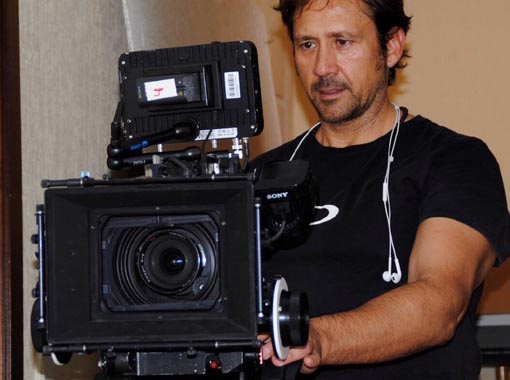
In those fifteen years, he has seen and known many stories --and has told some of them-- of people who have shown him that the origin does not have to determine the future.
Nobody has chosen where to be born, nor the circumstances that we have, that sometimes have us trapped, condition our life and we do not know how to escape; but Miguel Angel has met people who have escaped. Then, he reflected to try to understand what those variables were, what conditions us. Miguel Angel discovered that all those people had one thing in common: fear.
We all have fears: we are afraid of Being afraid.
We are afraid, on our way, to Fulfill our dreams, in order that our origin does not determine our destiny.
Miguel Angel says that we are afraid of the Determination: fear of not being able, not believing enough in ourselves to ask ourselves: Will I be able to reach that place I want to reach?. He says that we are all capable of doing what we set out to do and nobody will ask us how much we have been slow to get it or how much effort we have had to make, what matters is to achieve the objective. We have to overcome that fear of Determination.
According to Miguel Angel, we are afraid of Rejection; but to what rejection?. Rejection can not be felt by those who love us, because if they reject us, it is because they do not love us. And if a friend rejects you, at some point, it is not that he rejects you, but that he was not your friend.
We are afraid of the rejection of the rest of society, because many people criticize or advise us, everyone thinks of our life and that should not matter to us --as it does not matter to people who are capable of causing their origin not to determine their destiny--. For that reason, it does not make sense to be afraid of the rejection of people who really do not care about our lives.
We are afraid of Failure; that is why we do not undertake many tasks. But the failure is not to have reached the goal that we proposed ourselves. No, failure is not trying it. All people, who have changed their origins and who do not condition their destinies, have overcome the fear of failure.
We are afraid of not having sufficient Commitment with what we have said we want to do or want to achieve. We have that fear because we have been taught the logical sequence: desire is before the will. For example, I want to buy a car -- first I want it-- and then I save money to buy it. But it really is not like that --and the people who have fought so that their origin does not determine their destiny know it-- ; first I have to have the deep commitment to want to save money and, later, I want to buy that car. This is a very powerful tool and all people, who make that their origin do not determine their future, know it --and apply it-- .
We are afraid to Surrender, along the way. We are all very ashamed; but not by what others think --remember the fear of Rejection ... Rejection of who?--. Surrender to who, to ourselves?. Sometimes we want to try challenges, for which we are not well prepared; we tried and maybe we did not succeed, but we did not fail, because at least we tried.
And then, we have a huge fear of trusting. But it turns out that this is an irrational fear. We trust the politicians, the bus driver, in our hearts --that it does not stop beating--; but we rely on those things, which we can not control and on which we can not make decisions. For example, I have to trust that my heart keeps beating, because I can not do anything in order that my heart do it or not. Therefore, the people who are able to change the destiny that their origin had determined them, they trust in themselves. They trust in their hearts.
All the people, who have managed to get out of that destiny that they had predetermined, have done one thing: put their hearts and trust. Miguel Ángel calls this: "to be able to jump fear", because "LIFE, with capital letters, is on the other side of fear", this side is survival: work to eat, do everyday things .....; but maybe this has nothing to do with our dreams. Because we have many obligations to many people; but with ourselves we only have one obligation: to pursue our dreams. It is the only obligation. Pursuing our dreams does not guarantee our happiness; but not chasing them will give us unhappiness. It does not matter if we stay halfway, because we have been able to jump to the other side of fear.
At this point, Miguel Angel introduces us to a person, who represents everything he has explained to us. But before presenting it, he asks us to cover our eyes and be silent for ten seconds; then he wants us to imagine that it was like that forever. That person has been able to overcome fear of fear, not be afraid of whether she will have determination or not, that she does not mind rejection, that she does not mind failure, commit to pursue his dreams, know that she will fight until her last forces (not surrender) and, in addition, trust.
Miguel Angel has filmed the film of that person's life, and that person is called Gennet. And Gennet appeared on the stage of the conference, to tell her experience.
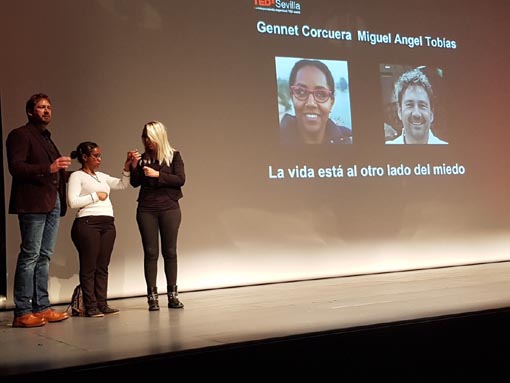
Gennet between Miguel Angel and the Gennet interpreter
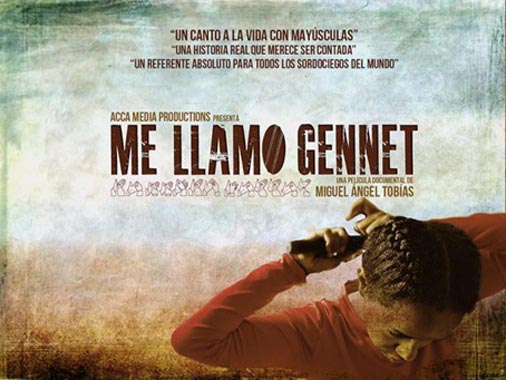
The film “My name is Gennet”
Miguel Angel says that Gennet was born, in Ethiopia, thirty-seven years ago, in a family of shepherds, nomads, very poor. Her biological parents, with four more siblings, decided they could not care for her; that if they stayed with her, her daughter was going to die. So they took her to the capital (Addis Ababa) and after trying to get the doctors to help Gennet recover her sight and hearing, when the doctors told the father that it was not possible, he understood that he could not go back with Gennet to his home and, therefore, he entrusted her in an orphanage of Mother Teresa of Calcutta. At that moment, in Ethiopia, there was a terrifying hunger; the nuns of that orphanage could only give Gennet and the other children a plate of food. And, when Gennet was sicker, weaker, a Spaniard (Carmen Corcuera), who had gone to Addis Ababa to visit her daughter, appeared in that orphanage --by chance or because she did not want to accept that her origin was going to determine her fate--, she met Gennet, she was impressed and the two weeks, which she thought to be in Ethiopia, became three years. Then, Carmen adopted Gennet and brought her to Spain. Gennet came when she was 9 years old and without any intellectual stimulation --because the nuns did not know how to communicate with her--. Gennet, in Spain, began an academic development, which made that ,at the age of 21, she entered the Institute --beginning at 11 years old--. And 4 or 5 years ago, she became the first deaf-blind, to obtain a university degree, in all of Europe.
If Gennet had not been able to overcome all those fears, which we have analysed before, she would not be here, being what she is.
Gennet says that she was afraid, when entering the University, because she thought that she did not have that capacity. She also knew that it was going to be a tough situation for her: but she found the support of her adoptive mother and, thanks to her, Gennet lost her fear of being in the University and she got her degree --also with her effort, of course--.
She was also helped a lot by the interpret, whom she had in the Institute, because it gave her a lot of security --although with the communication tablet, she no longer needed the interpreter, in the University—.
Gennet also was afraid when she did the university entrance exams; but she got a good grade and got what she wanted. Gennet says that it is true that she has had many fears, but thanks to her mother, who gave her peace of mind, she was able to overcome them. When her adoptive mother died, gennet looked for that kind of support in other institutions. With that help, she has turned those fears into a struggle of life, to achieve everything that she propose herself.
Currently, Gennet lives in Seville, independently, with her dog --who supports her, in nearby locations. She has had a dog since her mother died and Gennet went to live in Seville, from Madrid. She has new friends and each time she meets more people. She says that in close locations she handles herself well, with her dog; but in places further away from home and around, she needs the help of her personal assistant.
At this point, Miguel Angel highlights the merit of Gennet, when his adoptive mother died and she went to live alone in Seville --but she was not afraid to change the city--. Gennet, who does not see or hear and has no sense of smell --with the result that she has almost no taste-- learned to cook and iron --that is what you can see in the film--. Miguel Angel says that in the film Gennet is also seen with her dog; but it is not a guide dog, as everyone thinks, but it is a dog that Gennet adopted, because it was going to be sacrificed.
Another surprise is that Gennet went to the refugee camps, in the Sahara, to give courses to teachers, who work with deaf-blind people, to encourage them to work with children who are deaf-blind. And Gennet does not say NO to anything. With everything that is asked of her, she is jumping fears.
Miguel Angel asks her what is the most important thing in her life and she replies: "The most is to feel happy, to feel calm, to feel good, even having changes in my life, but to feel good, to feel calm".
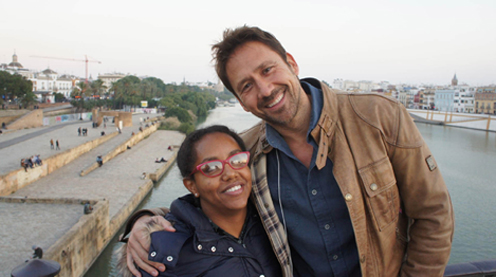
Gennet is happy in Seville
Currently, Gennet is working, as a special educator, in the only residential center for children who are deaf-blind, in Spain,
Miguel Angel also asks her what frightens her now, if she fears the future; and Gennet replies: "No, fear no, I have experience of having felt fear, at other times, and then I feel calm, in that sense; I have people around me, I am not alone, I know certain solutions for certain problems, that can arise and, then, I feel calm”.
To finish, Miguel Angel asks her what would be the message that she would like to give to all those attending the conference. And Gennet answers: "I want that, through the film that I have participated with Miguel Angel, be seen the evolution that a deaf-blind person can have; that Society knows what is deaf-blindness; that my example serves as an example to follow, in that sense; that this disability is known and that Society knows that the deaf-blind can do everything, independently, and that we can be effective, just like any other person”.
Miguel Angel asks Gennet What would be her advice to people who have so many fears, but we do not have any disability. And Gennet says: "Regardless of whether there is disability or not, you must leave fear out; you must give priority to feel good; doing things that benefit you; being aware that you are capable of doing anything, with disabilities or without it, in exactly the same way as another person; do not feel less yourself, because you see less capable yourself, but quite the opposite; promote your ability, which surely you have it".
Gennet says goodbye to the public saying: "I am delighted to be here and thank you very much".
Miguel Angel also says goodbye saying: "Life is on the other side of fear, thank you".
Well, I hope you will like this article, as well as me. I liked the courage and determination of Miguel Ángel, when he decides to look for impressive stories, like Genet's, and he tells them with his films; but I have also been impressed by his own story of overcoming, when in 2003, he went with two friends to Los Andes. They climbed up a mountain and, suddenly, all three felt sick. Then, Miguel Angel decided to go down the mountain, with a great effort, to ask for help; but he was so bad that he took refuge in a corner and fell asleep. After a while, he noticed a hand, which touched his face –it was his hand, of course--, then he woke up and, with a great effort, he began to walk. He was lost –without food and water and freezing to death--. Suddenly he found a small road --built only to build a warehouse and, therefore, almost no car circulated over there; but, surprisingly, a very old man appeared, on his motorcycle, and he helped Miguel Angel to get out of that situation, which seemed miraculous. Miguel Angel tells this experience in his book “Renacer en los Andes”--.

On the other hand, I have identified with Gennet --In spite of the apparent differences, because she has had more difficulties than me-- , because I have had many difficulties, in my eyes, since I was born; but with a great tenacity, with a lot of discipline and a lot of self-love, I have been able to overcome some fears and I achieved my challenge of being a Bachelor in Image and Sound. I always had the great help of my parents and also of other people; but I also tried hard, because I trusted a lot in myself. That is why I was not afraid of several operations --because I knew I was going to improve a lot, as it happened--. That is why I did not care when some people did not trust me --I did not want to hold a grudge against them, not even those who made fun of me, for wearing glasses; but I did not want to waste my time listening to them either--. So, that was my “recipe”, that was my Commitment, with myself. At the end, I found the word Commitment of which I spoke to you, at the beginning of this article, remembering my own experience and through the impressive stories of Gennet and Miguel Angel.
Until my next post, kind regards,
Luis.
Sponsored by Costaluz Lawyers.
Please click below:
